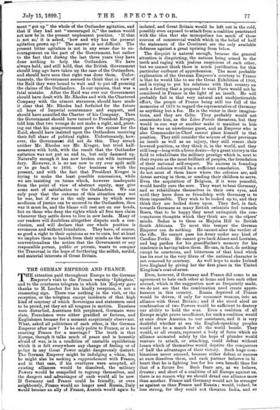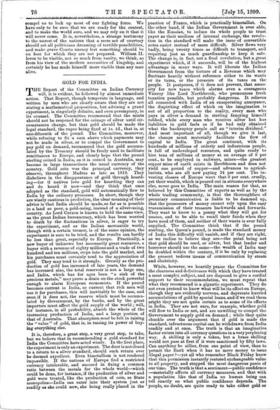THE GERMAN EMPEROR AND FRANCE. T HE attention paid throughout Europe
to the German Emperor's visit to the French warship Iphiginie,' and to the courteous telegram in which his Majesty gave thanks to M. Loubet for his kindly reception, is not a reassuring sign. There was nothing in the visit, or the reception, or the telegram except incidents of that high kind of courtesy of which Sovereigns and statesmen used to be proud, yet they set all tongues in motion. Russians were disturbed, Austrians felt perplexed. Germans were elate, Frenchmen were either gratified or furious, and Englishmen became for a moment suspiciously observ ant. What, asked all politicians of each other, is the German Emperor after now ? Is he only polite to France, or is he courting France for a marriage ? The truth is that Europe, though it talks much of peace and is honestly afraid of war, is in a condition of unstable equilibrium which it is felt everywhere any change of feeling or of policy in any Great Power might dangerously disturb. The German Emperor might be indulging a whim, but he might also be seeking a rapprochement with France, and in that case, if his overtures were accepted, all existing alliances would be dissolved, the military Powers would be compelled to regroup themselves, and the dangers and-advantages of each would all be new. If Germany and France could. be friendly, or even neighbourly, France would no longer need Russia, Italy would become an ally of France, Austria would again be isolated, and Great Britain would be left out in the cold, possibly even exposed to attack from a coalition penetrated with the idea that she monopolises too much of those sources of commercial wealth which in the belief of half the statesmen of the Continent are the only available defences against a great uprising from below.
The disquiet is natural enough, because the general situation is disquieting, the nations being armed to the teeth and raging with jealous suspicions of each other, but we cannot think there is much justification for this particular outburst of apprehension. The most probable explanation of the German Emperor's courtesy to France is that he would like to see the Great Exhibition of 1900, and is trying to put his relations with that country on such a footing that a proposal to visit Paris would not be considered in France in the light of an insult. He will probably fail in that very natural and unobjectionable effort, the people of France being still too full of the memories of 1870 to regard the representative of Germany as anything but a foe. He is the victor in their imagina- tions, and they are Celts. They probably would not assassinate him, as the Libre Parole threatens, but they would in one way or another make it manifest to him that he was an unwelcome guest, and an Emperor who is also Commander-in-Chief cannot place himself in that position. They still consider the seizure of their provinces an insult as well as an injury, they still resent , their lowered position, as they think it, in the world, and they still long—long with a fierce desire—by a great victory in the field to rehabilitate the military prestige which is, next to their repute as the most brilliant of peoples, the foundation of their national self-respect. No success in founding tropical colonies would be a sufficient consolation. They do not most of them know where the colonies are, and detest serving in them, or sending their children to serve. Even the acquisition of Belgium, if it were peaceful, would hardly cure the sore. They want to beat Germany, and so rehabilitate themselves in their own eyes, and until they have done so friendship with Germany is to them impossible. They wish to be looked up to, and they think they are looked down upon. They feel, in fact. towards Germans as many British colonists feel towards Boers, that to be happy they must extinguish the con- temptuous thoughts which they think are in the otters' minds. Sedan is to them as Majuba Hill to British South Africans. To meet this temper the German Emperor can do nothing. He cannot alter the verdict of the rifle. He cannot pass his Army under any kind of Caudine Forks. He cannot give back Alsace and Lorraine, and beg pardon for his grandfather's memory for his insolence in having taken them. He can, in fact, do nothing except be courteous, and bitterness of that kind which has its root in the very fibres of the national character is not removed by courtesy. As well hope to make Ireland love England by giving her the first place in the United Kingdom's coat-of-arms.
Even, however, if Germany and France did come to an agreement to hate each other at home and love each other abroad, which is the suggestion now so frequently made, we do not see that the combination need create appre. hension in this country. Russia deprived of France would be driven, if only for economic reasons, into an alliance with Great Britain ; and if she stodd aloof no combination of two Powers would be sufficient to destroy our ability to hold the seas. Even a coalition of all Europe might prove insufficient, for such a coalition would at once draw America to our assistance, and it is very doubtful whether at sea the English-speaking peoples would not be a match for all the world beside. They would, at all events, represent a body of force which no affiance animated solely by the hope of plunder would venture to attack, or attacking, could defeat without losses which of themselves would deprive the conquerors of half the advantages of their victory. Such huge com- binations never succeed, because either defeat or success at once dissolves them, and each partner believes in hi. heart that he is fighting less for his own benefit than for that of a future foe. Such fears are, as we believe, dreams ; and short of a coalition of all Europe against us, there is no reason why we should dread one alliance more than another. France and Germany would not be stronger as against us than France and Russia ; would, indeed, be less strong, for they could not threaten India, and so compel us to lock up most of our fighting force. We have only to be sure that we are ready for the contest, and to make the world sure, and we may rely on it that it will never come. It is, nevertheless, a. strange testimony to the unrest of the nations that a mere act of courtesy should set all politicians dreaming of terrible possibilities, and make grave Courts uneasy lest something should be on foot for which they are not prepared. William II. loves to be visible, not so much from vanity, we think, as from his view of the modern necessities of kingship, and certainly he has made himself more visible than any man alive.







































 Previous page
Previous page